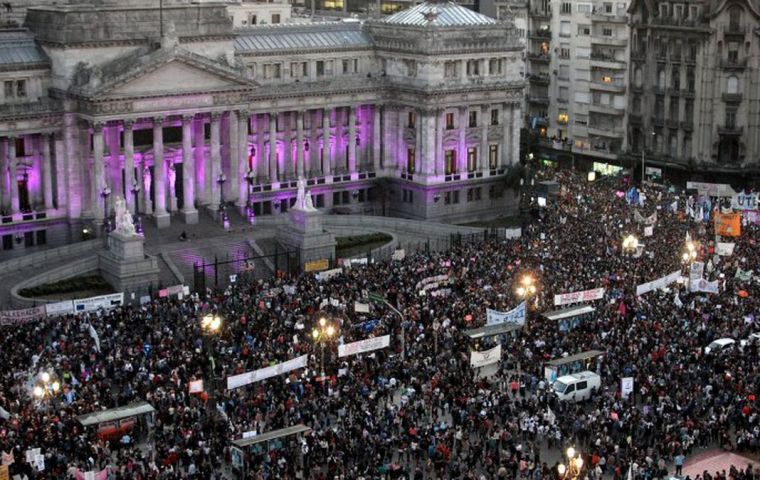MercoPress. South Atlantic News Agency
Women's Day celebrated all over Mercosur
 “Let's keep moving forward, comrades, with love and firmness,” CFK said
“Let's keep moving forward, comrades, with love and firmness,” CFK said Women took to the streets of the capital cities of the three Spanish-speaking Mercosur countries to celebrate International Women's Day. There were similar events in other towns throughout the region, it was reported.
In Montevideo, demonstrators marched along the main avenue and read a proclamation before the Executive Tower (Presidential Palace):
“We are a diverse and struggling fabric. We are women, lesbians, trans. We are Afro, mestizo, and white. We are mothers or we want to be. We were born here or migrated from far away. Today we choose to walk together to the sea because we defend our bodies from violence, but we cannot sustain these women's bodies, these trans bodies, these non-binary bodies, these fat bodies, without defending our territories from dispossession and poisoning, and this implies taking care of human and non-human life,” the activists said.
“That is why here we are again in the streets, again in a feminist strike to shout that if we stop, the world will stop,” they went on.
“Violence with its most terrible face, femicide, trafficking, and rape. Violence to which the state justice system responds in an absurd and unjust way. It only thinks of punishment and more penalties, but we know that feminist justice is that it never happens again. Violence that is also racist and colonizing. Violence that tears our bonds, damages our psychological and physical health, and leaves deep social wounds. Violence is also the precariousness of our lives, of our jobs, the impossibility of having access to a decent house to live in, especially if we are migrants. We all know about our juggling to make ends meet, about the skyrocketing prices,” the women added.
“We want to care and be cared for, so we reinvent feminist plots to sustain our lives and the struggle,” Montevideo's women stressed. “We want there to be not one more dead or disappeared woman. We want a world where work is to sustain life, where violence does not continue to multiply like a plague, where we have dignified health and feminist education, where comprehensive sex education is present in all spaces.”
In Asunción, women from different organizations, gathered in the afternoon at Plaza Uruguaya, from where people marched to Plaza de la Democracia under the motto “United and mobilized” in demand of equal rights, an end to violence, harassment, and job insecurity, among other requests.
“We are here to fight for our rights, for justice, for equality at work, for all women to have the same rights as men and to be respected,” a demonstrator told reporters.
“I dream of a country where there is no longer violence of any kind and of any nature. We are a country that is full of violence and drug trafficking. We are here looking for equality,” another participant said.
Mobilizations also took place in the cities of Pedro Juan Caballero, Encarnación and Ciudad del Este, according to reports.
There are 230,000 household workers nationwide, of which 96% are women, according to the website Paraguay.com. Currently, only 6.8% of these workers are registered and therefore entitled to social security benefits after the Household Work Law was passed in 2019 to end labor discrimination. Many such workers still earn below the established minimum wage, according to news outlets.
In addition to that, 37% of Paraguayan households are supported solely by single mothers and 66% of the people who work illegally are women.
In Argentina, thousands of women marched through the streets of downtown Buenos Aires in two separate groups to demand equal pay and an end to femicides and gender violence.
Women organizations set out to “win over the street” after the COVID-19 pandemic and at a time of shock following the recent gang rape of a teenage girl by allegedly six suspects, all of whom have been arrested.
But the Argentine women were split between those who support President Alberto Fernández and those who do not. Issues like an impending deal with the International Monetary Fund (IMF) were also raised.
Fernández himself presided over a ceremony in José C. Paz, a municipality in the Greater Buenos Aires area to celebrate 8M together with Mayor Mario Ishii and the officials Victoria Donda and Marita Perceval from the federal administration, in addition to Mexican writer and researcher Beatriz Gutiérrez Müller, Women Minister Elizabeth Gómez Alcorta and the Presidential Legal and Technical Secretary Vilma Ibarra.
“This #8M let us, men, also reflect,” Fernández posted on social media. “We must rethink and avoid those actions that deepen gender inequality. Only then will we be a better society, only then will we not miss #NiUnaMenos,” he added.
Meanwhile, Vice President Cristina Feernández de Kirchner stressed that “the path is always organization, unity, the defense of what has been conquered and the struggle for what we still lack.”
“On this International Working Women's Day, let's keep moving forward, comrades, with love and firmness,” said the former head of State.
Minister Gómez Alcorta said that International Women's Day “is a great day of struggle, not of rest”, and that the “debt is with us because we are overrepresented in poverty.” She also said the gang rapists were not “beasts,” but rather a part of society and “respond to the same cultural matrix.”




Top Comments
Disclaimer & comment rulesCommenting for this story is now closed.
If you have a Facebook account, become a fan and comment on our Facebook Page!